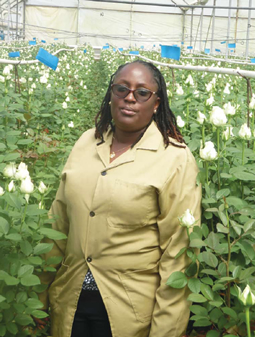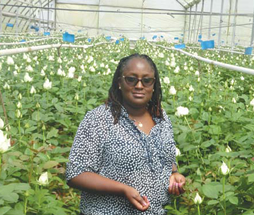Concisely describe Christine Karambu
Christine is an agronomist and administrator with vast experience in the floriculture sector for over 18 years. The JKUAT graduate in horticulture who later on studied Business Administration, majoring in HR at KEMU holds several certifications gained during her professional path. She holds, among others FACTS; an international Fertilizer Recommendation course offered by BASIS and Women in Leadership by Strathmore University. Over the years, she has progressed through the ranks from a junior supervisor to her current level of senior management.
 What spurred you into growing? Any role model who inspired you?
What spurred you into growing? Any role model who inspired you?
In all honesty, I never thought this would be my career path. I grew up in a family that did large scale farming: my parents retired from their professions to exclusively focus on farming. I did not have interest then, until I joined high school and started feeling the touch. My interest grew as I watched my parents address and train students from colleges and other institutions of higher learning. Through the results of my hard work, as well as the multiple challenges I faced on my journey, my inspiration grew exponentially, to the point where I firmly knew my interest lay in the industry.
Kindly take us through your journey as a grower to your current position.
I have been in the floriculture sector for a total of 18 years. As you can see, I’m no spring chicken in the field. After college, I began my journey in (the former) Kijabe Limited as a supervisor and then joined 3 other companies as I rose through the ranks. I’m presently at the Oserian Development Company, as a senior grower, and I’ve been here for the last four years and counting. In addition to this, I over-see the company’s Research and Development unit.
Briefly discuss the challenges you go through daily? What would you point out as your strongest attribute that has made you succeed? How do you rise up to the greatest challenge that your job presents?
Growing presents different challenges every day: the weather patterns are unpredictable, pests and diseases are always piling on pressure and the market trends are typically volatile. Early on, I struggled with numerous, varied challenges. I’ll admit to that much. But rather than get cowed and give up, I chose to adapt and grow. This helped me internalize one of my most valuable lessons: every challenge has a solution; you just have to think outside the box sometimes. I have learned the value of self-motivation, constant research to stay ahead, lots of consultation and taking one day at a time. I have learned that each day, at the very least, presents a learning opportunity or two. My job also requires that I motivate others; I really have no window for dullness or giving up. For the sake of my staff and the projects I am at the helm of, I have to be perpetually motivated. To lead properly, I have to actually listen, as opposed to just hearing things.
Describe how you manage expectations, as well as go about goal-setting for your staff.
My current mantra is “Employee First, Consumer Second.” I know this sounds unconventional, but I can attest to its effectiveness. By motivating my employees and making sure they view their jobs with pride and love, I automatically give them the right tools and information to ensure the customer gets the best service and the best product. It really is killing two birds with one well-aimed stone.
I also believe in keeping everyone informed of expectations well in advance. In addition to keeping the team sufficiently mentally prepared, it helps them link up better. I believe in opening up avenues of easy communication on new ideas, any complaints and general, regular interaction.
As a woman in a position of leadership, have you felt that at times, the scrutiny was much more intense just by virtue of being a woman?
How do you respond to this? Yes, I have experienced this, but this was largely confined in the first few years of my career. Early on, in addition to the sector hardly having any women in positions of authority; the landscape was such, that the bulk of professionals plying their trade in the sector were not college/university-educated professionals. They were mostly seasoned veterans who had spent years learning on the job. They built competence by virtue of grinding day after day, year after year. But they lacked the technical coaching imparted upon protégés by the college/university system. So when the likes of myself came in, we were somewhat of a foreign breed. And being a woman, in addition to my collegiate roots, must have compounded things. But by and by as I proved my competence, things became easier and ample professional regard was established.
Today, it really is smooth sailing for the most part. But if there’s scrutiny of any nature or form, I fall back on the time-tested strategy of using my work results to tell my story and prove my competence. It hasn’t failed me once. Using the scrutiny as a motivational element, in those early days, made me stronger and more durable, and I have learned to smile every time I see challenges coming my way.
 Kenya is a major player in the global flower industry; what are the most prevalent challenges that get in the way of building the flower sector? Do you get the notion that at times, the Kenyan government does not accord the industry with the requisite seriousness it deserves?
Kenya is a major player in the global flower industry; what are the most prevalent challenges that get in the way of building the flower sector? Do you get the notion that at times, the Kenyan government does not accord the industry with the requisite seriousness it deserves?
The sector is faced with very diverse challenges, with the most recent, and prevalent ones being the fertilizer shortages that are caused by the government inspections; the stringent market regulations and restrictions on pesticides; the unpredictable, volatile market returns; numerous taxations by the government; increased costs of inputs; newly emerging pests and diseases; unusual pest and disease life cycles, and seasonality; increasingly unpredictable weather patterns and rising freight costs. As you can see, the deck is presently pretty stacked against the floriculture sector. Still, there are ways to mitigate these challenges:
The sector, and the firms within it, needs to look for lean and diverse solutions so as to cut down on wastefulness and avert the diminishing returns. There is a necessity to prioritize efficiency in the sector, as this is the only sure way to keep profitability up. And if anything, the entire field of agriculture is already struggling badly with waste. Even taking the financial bottom-line out of the equation; the time is really nigh to cut down on waste and wastefulness as a whole.
Regarding the government; I’ll give a generic but comprehensive answer. The government needs to get involved more. The lawmakers need to look at things from our perspective and then revise some of their recent stipulations. Let’s examine one example: The floriculture sector is a super-earner here. It’s one of Kenya’s most potent Forex earners and without it; the economy would suffer. As it is, we are engaged in running battles with newly emerging stubborn pests and diseases, an unpredictable marketplace for our products and recurrent freight issues among other things. But somehow, the government decided the next logical step was to raise taxes on floriculture inputs and intensify pesticide inspections. You would think they’d do the opposite to help an economy-friendly sector out in these trying times. It’s a bit like biting the hand that feeds you. The new taxes on inputs need revision and the regulations that are affecting the sector need similar treatment.
What makes your farm’s produce unique and separates it from the rest?
Oserian is growing very unique flowers that not many other farms can manage due to the present disease pressure. This is because we have the advantage of having geothermal heating and carbon dioxide systems set up, which allows the farm the luxury to successfully grow very sensitive, uniquely shaped flowers. We also firmly believe in ‘Quality to Quantity’, both in length and head size.
What are some of your choice teamworkenhancing strategies?
I’m a big believer in motivation, I love to motivate because I feel you achieve the highest quality of work from a motivated team.
I love having open discussions with my team as it presents a wonderful opportunity to actively brainstorm and perhaps learn of things that may not have been too familiar. A positive attitude is a must, and I make sure to touch on it in most meetings we have. Of course, I make sure to lead by example too. Last but not least, I’m very insistent on efficiency. Like I said the floriculture sector is having significant issues with inefficiency and wastage, which is cutting into profits and overall affecting the industry negatively. Efficiency needs to be promoted from the very lowest level to ensure the best possible environment for success.
Do you have any personal projections that you would like to share on the future?
The flower sector will still be booming. But I need to make one thing clear: not everyone will survive. There will be those who fall by the wayside, or pull out and move into other avenues of business. Already, we are seeing some previously-major players either greatly downsizing their projects or throwing in the towel altogether and seeking business elsewhere.
The ones who survive will be those who are ready to embrace change, work on lean structures, aggressively promote efficiency and have an open mind that is malleable enough to welcome diversification. And if you look at my answers to this interview, you will realize I’ve made an effort to bring up these elements as often as possible.
 What is, in your informed opinion, the most potent challenge that the flower farmer faces today? How would he or she go about mitigating this particular challenge?
What is, in your informed opinion, the most potent challenge that the flower farmer faces today? How would he or she go about mitigating this particular challenge?
The most potent challenge is the rising costs of farm inputs, and the drawbacks to this one are especially magnified when you offset it against the steadily diminishing returns. The government’s new taxation regime on farm inputs isn’t helping either. As for mitigation, the first step needs to be the farmer’s own: have lean structures in place, make your projects as efficient as possible and be smart in how you invest in your farm(s). There’s also a case to be made that we farmers need to be more vocal as we make our plea to the government to overturn their new taxation regimen on inputs, as well as scaling down the all too intensive pesticide checks that are getting in the way of good business.
There are some flower farms that insist on gender equality, with regard to employment opportunities, and this is perhaps easier to apply seeing as how women have a natural affinity for the flower world. Do you have a gender equality dynamic going on in your niche?
We like this idea. However, there are a few issues that compound the integration of this: for one, there are very few women seeking to move up the flower industry ladder. In fact, the industry does not boast of too many trained women professionals, and this makes it difficult to properly implement such a dynamic. Recently, there has been a steadier stream of women professionals coming in, which is encouraging, but there is still a long way to go before the number of women professionals gets to that point where it rivals that of men, thus making it possible for the gender equality dynamic to be integrated. Still, I have faith that we will get there.
What is your preferred style of working or management? Does it in any way empower or affect the daily output of your team?
I have a very hands-on approach to leadership and management. Rather than just be a passive overseer, I like to dive in and get my hands dirty. I believe this not only makes me better acquainted with my staff members; it makes it possible for them to relate to me with more ease. I have an open door policy, and everybody is welcome to walk in and give their two cents. We have suggestion boxes where staff members can reach out to management and pose their queries, and we hold both weekly and monthly meetings. We also have what we call need-basis meetings: these are impromptu meetings that are held whenever something comes up. Meetings can last anywhere from 30 minutes to 2 hours… as long as it takes for the subject matter to be fleshed out exhaustively.
Briefly detail how you maintain balance in your life
I try my level best to complete my daily work duties within the day and in so doing, avoid taking work home. I firmly believe that taking work home just gets in the way of your family responsibilities, something which makes it difficult to properly bond with your loved ones as well as recharge amply. Family time is vital; I make sure to spend sufficient time with my family and gauge their psyche. I do a lot of community work as well to help me unwind and get in touch with society. I’m a big believer in alone-time: I make sure to frequently spend time alone with my thoughts and meditate. This helps me relax and be mentally prepared for the rigors of work, come work time.
A few words of advice to young girls
Young girls and youths, now more than ever, need to practice self-control and cull the desire for short-term satisfaction. It makes more sense, to draw up long term goals and stick with them.
It is necessary to build self-confidence, as this will be the biggest tool in helping you climb the corporate ladder. The most effective way to do this, in my experience, is to carefully evaluate the mistakes you make and seek to grow stronger and wiser from them. It pays to be hands-on; those that work under you will acknowledge this and their respect for you will grow tenfold. Ensure to always give credit where it is due. If you have positive feedback to give, give it promptly; likewise, if you have negative feedback to give, do not be afraid to dish it out. You can’t oversee a professional setup without acknowledging both sides. This is how a leader functions; with purpose, poise, vision and balance.
 What legacy would you like to leave behind?
What legacy would you like to leave behind?
I want to be remembered as one of the significant women leaders who pioneered the flower industry. I want to be known as a significant beacon that drew in young women into the flower industry, and showed them that it is indeed possible to forge a career in the industry. In this regard, I would love to be remembered in a mentor’s capacity. I want to be one of those people who helped raise the technological standard, so that it matched up to the steady morphing of pests and diseases into more elusive, hardier entities.
Give your final comments
Self-confidence is vital. It is important that you own your decisions. If I had to start from scratch again; I would largely make the same decisions I have made over the years, eliminating the few mistakes of course, and I would eventually wind up where I presently am.
It helps to believe in everybody. Try your level best to focus on the positives of others and not so much on the negatives. I believe that every single person has potential. Everyone deserves a fair shake, and this is something that needs to be upheld with more regularity.
